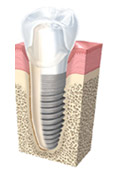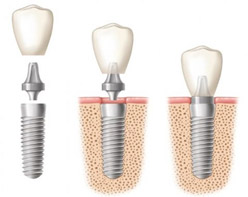IMPLANT TREATMENT

 Dental implants are small, screw-shaped materials made of tissue-friendly titanium that are placed into the jawbone to replace missing teeth. Implants are inserted into the jawbone through a minor surgical procedure. After about three months, they fully integrate with the bone. Once this integration is complete, the implant acts like a natural tooth root and becomes ready to support the prosthetic tooth placed on top.
Dental implants are small, screw-shaped materials made of tissue-friendly titanium that are placed into the jawbone to replace missing teeth. Implants are inserted into the jawbone through a minor surgical procedure. After about three months, they fully integrate with the bone. Once this integration is complete, the implant acts like a natural tooth root and becomes ready to support the prosthetic tooth placed on top.
Implants are also used to support crowns, bridges, or dentures.
In some cases, patients with no teeth at all can get implant-supported dentures for better comfort. Compared to other methods used to replace missing teeth, implants are generally more reliable and natural-looking.
Can implants be applied to every patient?
If the patient has sufficient bone volume and is in good systemic health, implants can be placed in any patient whose growth and development are complete. In cases where the bone structure is insufficient, graft materials or advanced surgical techniques can be used to overcome this problem.
Will I feel pain during implant placement?
Local anesthesia is administered before the implant procedure, so patients do not feel pain. Many people think implant surgery is very painful or difficult, but in reality, it is as simple as a tooth extraction and usually takes about 20-30 minutes.
When can implants be placed after tooth extraction?
Implants can be placed during the same session as tooth extraction in suitable cases, or 4-8 weeks, 12-16 weeks afterward, or conventionally 3 months after lower jaw tooth extraction and 6 months after upper jaw tooth extraction.
When can I get my prosthetics after implant placement?
Prosthetics can be placed after the bone and implant have fully integrated, which typically takes about 3 months.
Is there an age limit for implant application?
Implants can be applied to any patient who has completed growth and development and has suitable general health and bone structure. Our main patient group in need of functional implants includes elderly patients and those using removable dentures.
How should oral care be managed after implant surgery?
Patients should pay extra attention to oral hygiene after implant surgery. Tooth brushing, interdental brushes, dental floss, and oral irrigators are recommended.
We advise patients who smoke to quit, as smoking can interfere with wound healing and oral care. Postoperative follow-ups at regular intervals are also recommended.
Postoperative Care and Precautions:
 After surgery, antibiotics and painkillers should be used. Avoid spitting, sucking through straws, and smoking, as these actions can dislodge blood clots and delay healing. To prevent damage to gum tissues, only soft foods should be eaten. The implant area should not be cleaned for one to two weeks. However, other teeth in the mouth should be brushed, and the surgical site should be kept as clean as possible using an antibacterial mouthwash recommended by your dentist.
After surgery, antibiotics and painkillers should be used. Avoid spitting, sucking through straws, and smoking, as these actions can dislodge blood clots and delay healing. To prevent damage to gum tissues, only soft foods should be eaten. The implant area should not be cleaned for one to two weeks. However, other teeth in the mouth should be brushed, and the surgical site should be kept as clean as possible using an antibacterial mouthwash recommended by your dentist.
Sutures should be removed 7-10 days after surgery unless dissolvable sutures were used.
After placing the implant in the jawbone, several months are needed for the implant to integrate with the bone.
Usually, the top of the implant lies under the gum tissue. After a few months, without a second surgery, the implant is exposed with a simple procedure, and gum shaping caps are placed to give the gum a natural form. After 2-3 days of placing the gum shaper, prosthetic procedures can begin.
What factors affect the success of implant treatment?
The success rate of implant surgery is over 90%. Failures usually occur within the first year after surgery. After this period, the annual failure rate decreases to about 1%. Factors such as surgical trauma, infection around the implant, smoking, and anything that impairs blood flow to the bone and gums can reduce implant integration and success.
Other factors influencing success include:
• The surgeon’s experience and skill,
• The quality of the implant used,
• The amount and quality of the patient’s bone,
• The patient’s oral hygiene and overall health,
• Appropriate prosthetic restoration on the implant.
What are the benefits of dental implants?
The purpose of dental implants is to restore missing teeth, eliminate chewing problems, and provide excellent aesthetics and function. Implants can be used in cases of single missing teeth, multiple missing teeth, or complete tooth loss.

Benefits of Dental Implants:
▶ Prosthetics on implants have a natural tooth form.
▶ Patients with implants can comfortably eat whatever they want, fully restoring chewing function and healthy nutrition.
▶ Implants provide a more aesthetic appearance.
▶ Patients regain healthy teeth, boosting their self-confidence.







